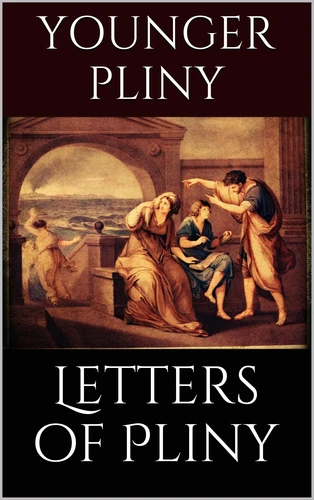Letters of Pliny
Par :Formats :
Disponible dans votre compte client Decitre ou Furet du Nord dès validation de votre commande. Le format ePub est :
- Compatible avec une lecture sur My Vivlio (smartphone, tablette, ordinateur)
- Compatible avec une lecture sur liseuses Vivlio
- Pour les liseuses autres que Vivlio, vous devez utiliser le logiciel Adobe Digital Edition. Non compatible avec la lecture sur les liseuses Kindle, Remarkable et Sony
 , qui est-ce ?
, qui est-ce ?Notre partenaire de plateforme de lecture numérique où vous retrouverez l'ensemble de vos ebooks gratuitement
Pour en savoir plus sur nos ebooks, consultez notre aide en ligne ici
- Nombre de pages357
- FormatePub
- ISBN978-3-7481-4781-7
- EAN9783748147817
- Date de parution17/10/2018
- Protection num.Digital Watermarking
- Taille1011 Ko
- Infos supplémentairesepub
- ÉditeurBooks on Demand
Résumé
GAIUS PLINIUS CAECILIUS SECUNDUS, usually known as Pliny the Younger, was born at Como in 62 A. D. He was only eight years old when his father Caecilius died, and he was adopted by his uncle, the elder Pliny, author of the Natural History. He was carefully educated, studying rhetoric under Quintilian and other famous teachers, and he became the most eloquent pleader of his time. In this and in much else he imitated Cicero, who had by this time come to be the recognized master of Latin style.
While still young he served as military tribune in Syria, but he does not seem to have taken zealously to a soldier's life. On his return he entered politics under the Emperor Domitian; and in the year 100 A. D. was appointed consul by Trajan and admitted to confidential intercourse with that emperor. Later while he was governor of Bithynia, he was in the habit of submitting every point of policy to his master, and the correspondence between Trajan and him, which forms the last part of the present selection, is of a high degree of interest, both on account of the subjects discussed and for the light thrown on the characters of the two men.
While still young he served as military tribune in Syria, but he does not seem to have taken zealously to a soldier's life. On his return he entered politics under the Emperor Domitian; and in the year 100 A. D. was appointed consul by Trajan and admitted to confidential intercourse with that emperor. Later while he was governor of Bithynia, he was in the habit of submitting every point of policy to his master, and the correspondence between Trajan and him, which forms the last part of the present selection, is of a high degree of interest, both on account of the subjects discussed and for the light thrown on the characters of the two men.
GAIUS PLINIUS CAECILIUS SECUNDUS, usually known as Pliny the Younger, was born at Como in 62 A. D. He was only eight years old when his father Caecilius died, and he was adopted by his uncle, the elder Pliny, author of the Natural History. He was carefully educated, studying rhetoric under Quintilian and other famous teachers, and he became the most eloquent pleader of his time. In this and in much else he imitated Cicero, who had by this time come to be the recognized master of Latin style.
While still young he served as military tribune in Syria, but he does not seem to have taken zealously to a soldier's life. On his return he entered politics under the Emperor Domitian; and in the year 100 A. D. was appointed consul by Trajan and admitted to confidential intercourse with that emperor. Later while he was governor of Bithynia, he was in the habit of submitting every point of policy to his master, and the correspondence between Trajan and him, which forms the last part of the present selection, is of a high degree of interest, both on account of the subjects discussed and for the light thrown on the characters of the two men.
While still young he served as military tribune in Syria, but he does not seem to have taken zealously to a soldier's life. On his return he entered politics under the Emperor Domitian; and in the year 100 A. D. was appointed consul by Trajan and admitted to confidential intercourse with that emperor. Later while he was governor of Bithynia, he was in the habit of submitting every point of policy to his master, and the correspondence between Trajan and him, which forms the last part of the present selection, is of a high degree of interest, both on account of the subjects discussed and for the light thrown on the characters of the two men.



